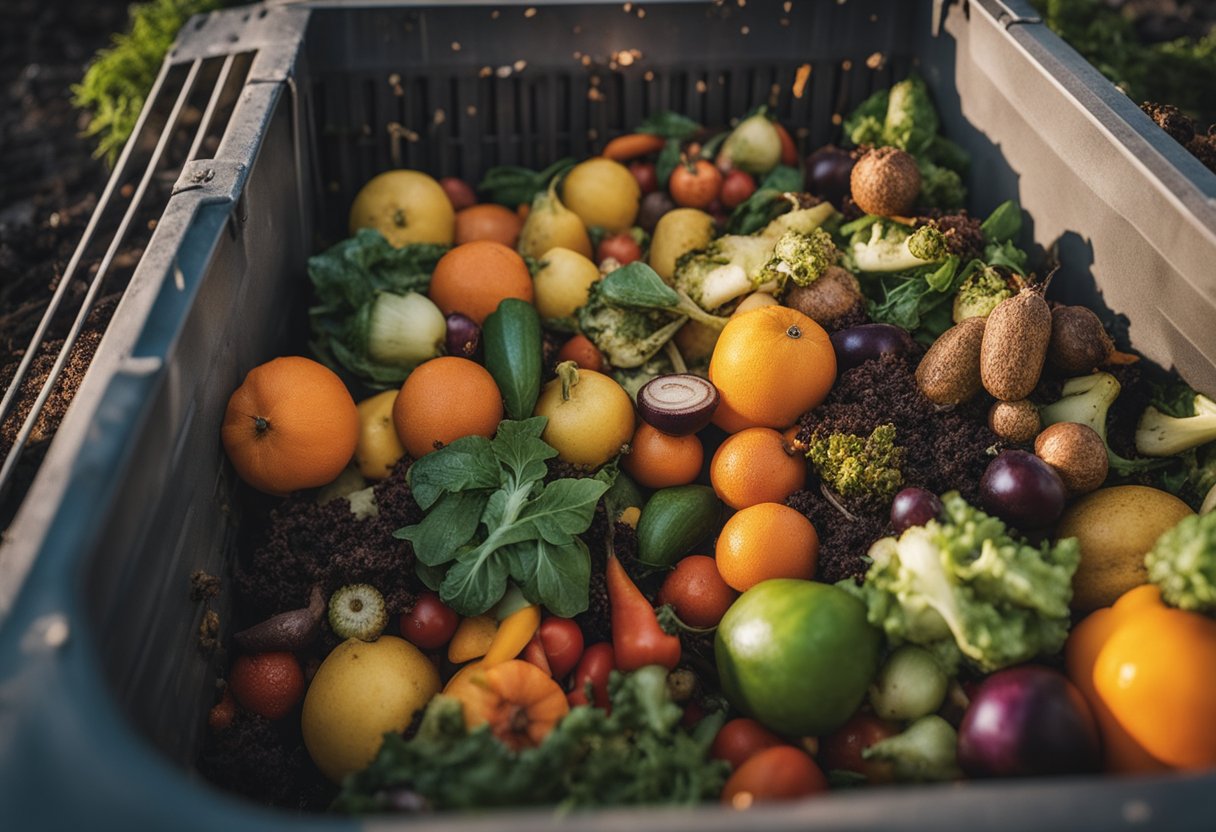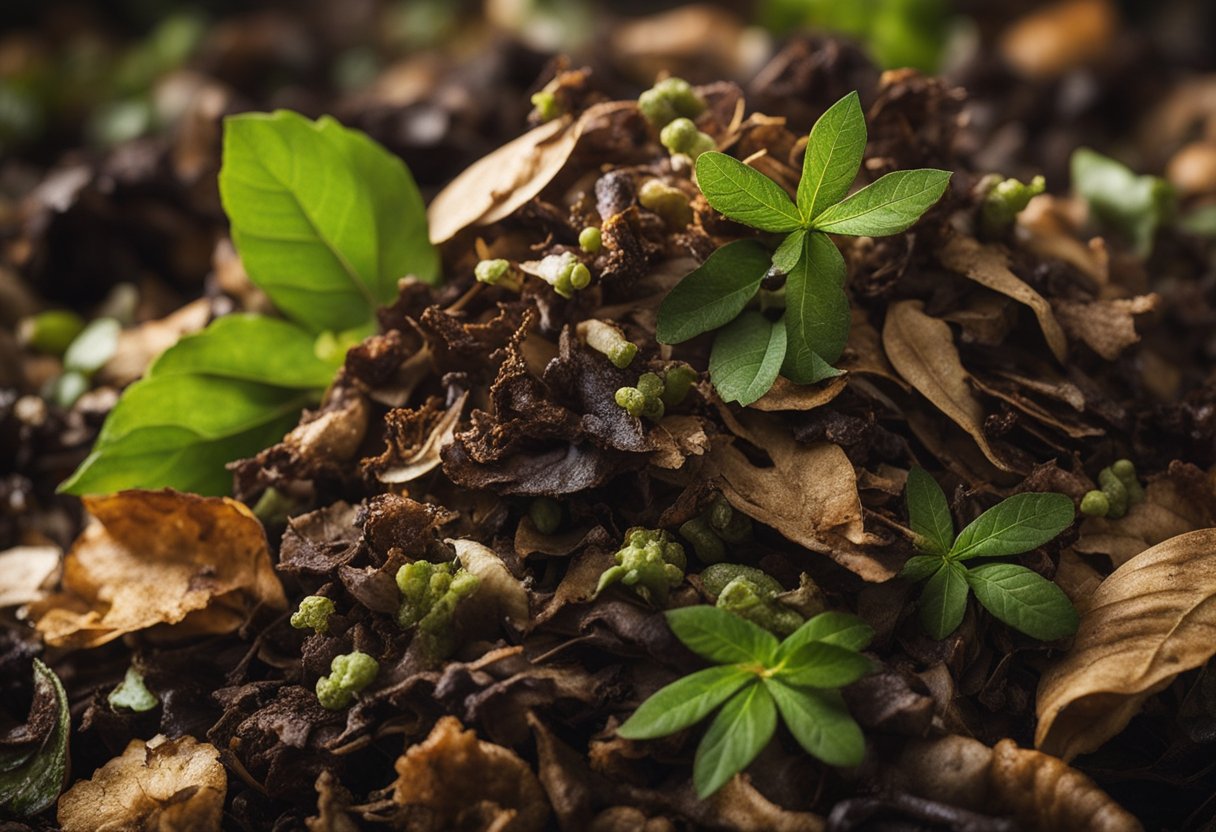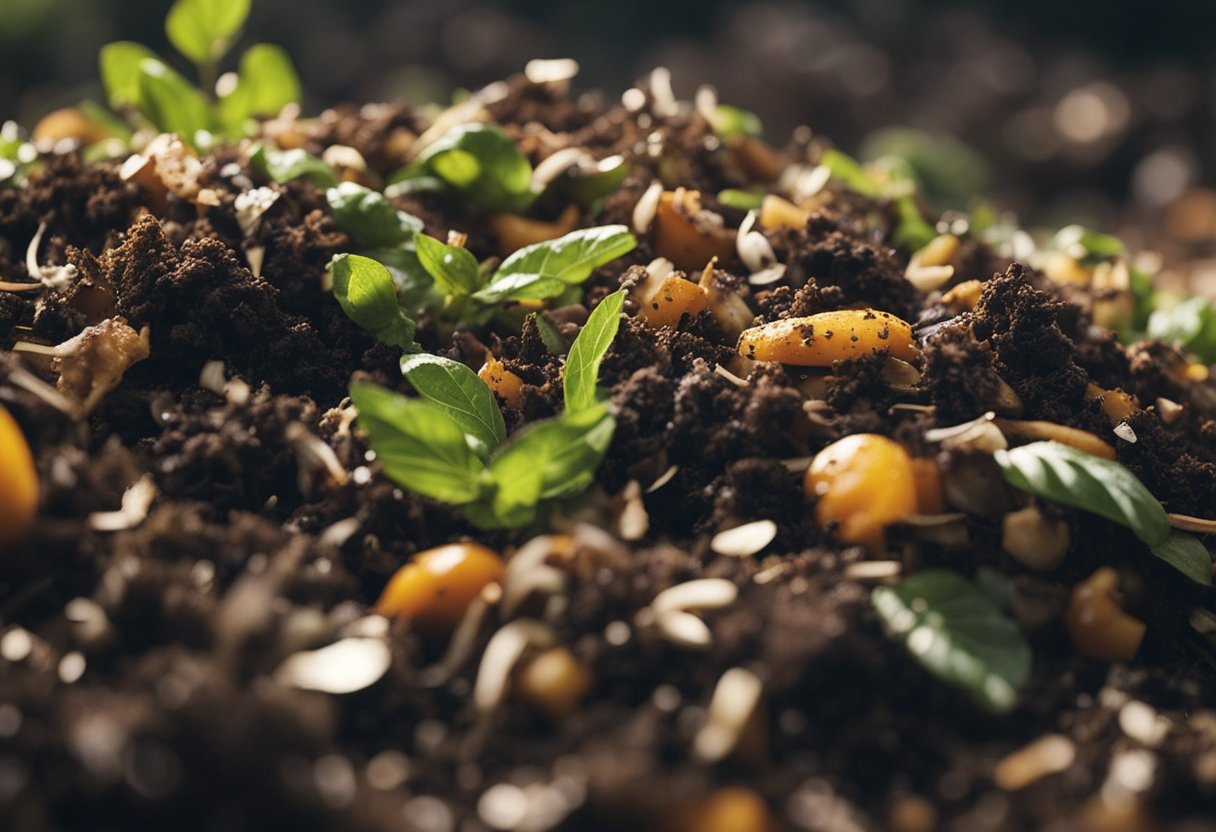As an Amazon Associate I earn from qualifying purchases.
At A Glance
Yes, you can compost rotten food. Composting is an excellent way to recycle the nutrients in spoiled food and return them to the soil. Rotten food is categorized as “green” material in composting terminology, providing necessary nitrogen for the composting process. Common rotten food items like fruits, vegetables, and grains are suitable for composting. However, it’s advisable to avoid composting meat, dairy, and oily foods as they can attract pests and create odors.
Composting is a great way to reduce waste and create nutrient-rich soil for your garden. As someone who is passionate about sustainability, I have always wondered if it is possible to compost rotten food. After doing some research, I have found that the answer is yes, you can compost rotten food.

Rotten fruits and vegetables are safe to put in a compost pile, according to Thriving Yard. However, it is important to be familiar with the signs of an unsafe compost ingredient. For example, you should avoid adding meat, dairy products, and diseased plants to your compost pile. Adding these items can attract pests and slow down the composting process.
While most rotten fruits and vegetables can be composted, there are some exceptions. For example, if the fruit or vegetable is covered in mold, it is best to avoid adding it to your compost pile. Mold can spread throughout your compost pile and cause it to smell bad. Additionally, if the fruit or vegetable has been treated with pesticides, it is best to avoid adding it to your compost pile. Pesticides can kill the beneficial microorganisms that break down organic matter in your compost pile.
Understanding Composting

Composting is a natural process of decomposition that turns organic waste into a nutrient-rich soil amendment. It’s a sustainable way to dispose of food scraps, yard waste, and other organic materials. Composting is a great way to reduce the amount of waste that goes into landfills and to create a valuable resource for your garden.
Composting involves the use of microorganisms, such as bacteria and fungi, to break down organic matter into a stable and beneficial soil amendment called compost. The process of decomposition is facilitated by the right balance of carbon-rich and nitrogen-rich materials, moisture, and oxygen.
There are two types of composting: active composting and passive composting. Active composting involves regularly turning the compost pile to ensure that the materials are evenly mixed and that enough oxygen is present to support the microorganisms. Passive composting, on the other hand, involves simply allowing the compost pile to sit and decompose over time.
Hot composting is a type of active composting that involves maintaining a high temperature in the compost pile to accelerate the decomposition process. This is achieved by mixing the compost pile regularly and ensuring that it has enough moisture and oxygen to support the microorganisms. Hot composting can produce compost in as little as a few weeks.
In summary, composting is a natural process of decomposition that turns organic waste into a valuable soil amendment. It involves the use of microorganisms to break down organic matter into compost. Composting can be done actively or passively, and hot composting is a type of active composting that accelerates the decomposition process.
The Composting Process

Composting is the process of breaking down organic matter into nutrient-rich soil. The process is simple and can be done in a variety of ways, from small-scale backyard composting to large-scale industrial composting. To compost rotten food, it is important to understand the composting process and how it works.
The composting process requires four main elements: air, water, bacteria, and decomposing organic matter. These elements work together to break down the organic matter into a nutrient-rich soil amendment.
When composting, it is important to balance the ratio of green and brown material. Green materials include fresh grass clippings, fruit and vegetable scraps, and coffee grounds. Brown materials include dry leaves, straw, and wood chips. The ideal ratio is 2:1 brown to green material.
The compost pile should be kept moist, but not too wet. Too much water can cause the pile to become anaerobic, which can slow down the composting process. Turning the pile regularly can help to aerate it and keep the composting process going.
Bacteria are the key players in the composting process. They break down the organic matter into smaller pieces that can be used by plants. To ensure that the bacteria have enough air to do their job, it is important to turn the compost pile regularly.
During the composting process, the temperature of the pile can rise to very high levels. This is due to the heat generated by the bacteria as they break down the organic matter. High temperatures are important for killing off any weed seeds or pathogens that may be present in the compost pile.
In summary, composting is a simple and effective way to turn rotten food into nutrient-rich soil. By balancing the ratio of green and brown material, keeping the pile moist, turning it regularly, and allowing the bacteria to do their job, you can create a compost pile that will provide your plants with the nutrients they need to thrive.
What Can Be Composted
Composting is a great way to recycle organic materials and create nutrient-rich soil for your garden. Here are some common items that can be composted:
Kitchen Waste
Kitchen scraps are a great source of nitrogen for your compost pile. Fruits and vegetables, coffee grounds, egg shells, bread, and tea bags are all safe to compost. Avoid adding meat, dairy, and oily foods to your compost pile as they can attract rodents and other pests.
Garden and Yard Waste
Plants and yard waste are great sources of carbon for your compost pile. Leaves, grass clippings, plant trimmings, flowers, and wood chips can all be used. Avoid adding weeds that have gone to seed or diseased plants to your compost pile.
Other Compostable Materials
Cardboard, paper, newspaper, straw, wood, cotton, sawdust, and hair can all be composted. However, it’s important to shred or tear these materials into small pieces before adding them to your compost pile.
Safe Animal Products
Manures from herbivores, such as cows, horses, and rabbits, are great sources of nitrogen for your compost pile. However, avoid using manure from carnivores, such as cats and dogs, as it can contain harmful pathogens.
Special Considerations
While rotten food and moldy fruits and vegetables are safe to compost, it’s important to be familiar with the signs of an unsafe compost ingredient. Avoid composting anything that has been treated with pesticides or herbicides, as these chemicals can harm the microorganisms in your compost pile.
In addition, it’s important to maintain a balance of nitrogen and carbon in your compost pile. Too much nitrogen can result in a smelly pile, while too much carbon can slow down the composting process. A mix of 2 parts carbon to 1 part nitrogen is a good rule of thumb.
By following these guidelines, you can create nutrient-rich soil for your garden while reducing the amount of waste that goes to the landfill.
What Should Not Be Composted
When it comes to composting, it’s important to know what you can and cannot add to your compost pile. Adding the wrong items can lead to a variety of issues, including attracting pests, creating unpleasant odors, and even spreading disease. Here are some things to avoid adding to your compost:
Kitchen and Household Items
- Meat, fish, and bones: These items take a long time to break down and can attract pests like raccoons and rodents. They can also create unpleasant odors in your compost pile.
- Dairy products: Milk, cheese, and other dairy products should be avoided as they can also attract pests and create unpleasant odors.
- Cooking oils and grease: These items should not be added to your compost pile as they can create a slimy mess and attract pests.
- Plastic and metal: These items will not break down in your compost pile and can contaminate your soil.
- Chemicals: Avoid adding any chemicals, including pesticides and herbicides, to your compost pile as they can kill beneficial organisms and contaminate your soil.
Garden and Yard Waste
- Diseased plants: Plants that are infected with diseases should not be added to your compost pile as the spores can survive and infect your plants later on.
- Weeds: Avoid adding weeds to your compost pile as they can continue to grow and spread even after they’ve been composted.
- Treated wood: Wood that has been treated with chemicals should not be added to your compost pile as the chemicals can contaminate your soil.
- Wood ash: While wood ash can be added to your compost pile in small amounts, too much can raise the pH level of your soil and harm your plants.
Pet and Human Waste
- Pet waste: Dog and cat feces should not be added to your compost pile as they can contain harmful bacteria that can cause respiratory problems and other health issues.
- Human waste: While human waste can be composted, it requires specialized equipment and should not be added to a home compost pile.
By avoiding these items, you can create a healthy and beneficial compost pile that will enrich your soil and help your plants thrive.
Benefits of Composting
Composting is a great way to reduce waste and benefit the environment. By composting rotten food, we can create a nutrient-rich soil amendment that is beneficial for plants. Composting is a natural way to fertilize your garden and improve soil health.
One of the benefits of composting is that it helps to enrich the soil with beneficial nutrients. Compost contains a variety of nutrients, including nitrogen, phosphorus, and potassium, which are essential for plant growth. These nutrients are released slowly over time, providing a steady supply of food for plants.
Another benefit of composting is that it helps to fertilize the soil with organic matter. Organic matter is important for soil health because it helps to improve the soil’s structure, retain moisture, and increase the soil’s ability to hold nutrients. Composting helps to add organic matter to the soil, which can help to improve the health of your plants.
Composting also helps to reduce the amount of waste that goes to landfills. When food waste is sent to landfills, it can create methane gas, which is a potent greenhouse gas that contributes to climate change. By composting rotten food, we can divert this waste from landfills and turn it into a valuable resource for our gardens.
In addition to these benefits, composting is also an easy and inexpensive way to improve soil health. Composting can be done at home with minimal effort and equipment. All you need is a compost bin, some food waste, and a little bit of patience.
Overall, composting rotten food is a great way to benefit the environment and improve soil health. By creating a nutrient-rich soil amendment, we can help to fertilize our gardens and reduce waste at the same time.
Tips for Successful Composting
Composting is a great way to reduce waste and create nutrient-rich soil for your plants. Here are some tips to help you get the most out of your composting efforts:
- Mix it up: A good compost pile needs a mix of “green” and “brown” materials. “Green” materials include things like fruit and vegetable scraps, grass clippings, and coffee grounds, while “brown” materials include things like leaves, straw, and shredded paper. Aim for a ratio of two parts brown materials to one part green materials.
- Get some air: Composting requires oxygen, so make sure to turn your compost pile regularly to keep it aerated. You can use a pitchfork or a compost turner to mix up the materials and add air to the pile.
- Add water: Your compost pile should be moist, but not too wet. If it’s too dry, it won’t break down properly. If it’s too wet, it can become anaerobic and start to smell. Aim for a moisture level similar to that of a wrung-out sponge.
- Cut it into pieces: Smaller pieces of organic material will break down faster than larger pieces. If you have a lot of large items like branches or corn stalks, consider running them through a mulcher or blender before adding them to your compost pile.
- Balance carbon and nitrogen: Composting is a delicate balance between carbon-rich “brown” materials and nitrogen-rich “green” materials. Too much of one or the other can slow down the composting process. Use a guide to help you determine the right mix for your compost pile.
- Shred it: Shredded materials break down faster than whole materials. Consider shredding your paper, leaves, and other materials before adding them to your compost pile.
- Know what’s safe to compost: While most fruit and vegetable scraps are safe to compost, there are some exceptions. For example, you should avoid composting meat, dairy, and oily foods, as they can attract pests and create odors.
By following these tips, you can create a healthy compost pile that will provide nutrients for your plants and reduce waste in your home.
Common Composting Problems and Solutions
Composting is a fantastic way to reduce waste and create nutrient-rich soil for your garden. However, like any process, it’s not always smooth sailing. Here are some common composting problems and solutions to help keep your compost heap healthy and productive.
Materials Are Not Breaking Down Quickly Enough
One of the most common complaints when it comes to composting is that things are taking too long. There are a number of reasons why materials in your composting system might be taking longer than they should to break down. Temperatures may be too low (or too high), there might not be enough oxygen getting to the materials, or the moisture levels may be off.
To speed up the composting process, make sure you’re using a good mix of materials, including both “green” materials like vegetable scraps and grass clippings, and “brown” materials like dried leaves and twigs. Turn the pile regularly to aerate it and ensure that there’s enough oxygen getting to the materials. Finally, keep an eye on the moisture levels and add water if necessary.
Stinky Compost
If your compost heap starts to smell, it’s a sign that something is off. The most common cause of a stinky compost heap is too much moisture. This can create an anaerobic environment that produces unpleasant odors.
To fix a stinky compost heap, first, make sure that it’s not too wet. If it is, add some dry materials like straw or shredded paper to absorb the excess moisture. You can also add some fresh air to the heap by turning it more frequently.
Rodents and Other Pests
Composting can attract rodents and other pests, especially if you’re composting food scraps. To keep pests out of your compost heap, make sure that you’re not adding any meat or dairy products, which can attract rats and other vermin. You can also try burying food scraps deeper in the pile to make them less accessible.
If you’re still having problems with pests, you can try using a hot compost heap. This type of composting heats up the materials to high temperatures, which can kill off any disease or pests that might be present.
Respiratory Problems
If you have respiratory problems like asthma, composting can be a challenge. The composting process can create dust and other particles that can irritate your lungs.
To reduce the risk of respiratory problems, make sure that you’re composting in a well-ventilated area. You can also wear a mask or other protective gear while turning the pile or handling the materials.
Overall, composting is a great way to reduce waste and create nutrient-rich soil for your garden. By addressing these common composting problems and solutions, you can keep your pile healthy and productive.
